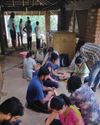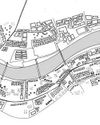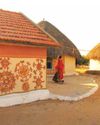Intentar ORO - Gratis
Conserving The Past For The Future
Indian Architect & Builder
|October 2017
While history is a largely intangible phenomenon, architecture is one of the few artistic sciences that lend history a certain kind of tangibility. It offers us a chance to experience the past through the built landscape, making it possible to, quite literally, walk down the memory lane. However, our increasingly apathetic attitudes have reduced heritage architecture to elaborate yet unkempt, decaying structures, and conservation to superficial beautification.

Torn between intensive restoration efforts and quick-and-easy redevelopment, our cities are rapidly losing the cultural heritage reflected in the very essence of our built fabric. We speak to conservation architect Vikas Dilawari on issues plaguing conservation and restoration, and how, with a little bit of sensitivity and understanding, we might just be able to salvage the situation.
IA&B: What is the current state of public awareness regarding heritage and conservation?
Vikas Dilawari: Public awareness regarding heritage is much better than conservation, as conservation is more technical in nature and requires a philosophical understanding too. People are now aware of their city’s antiquity and built heritage, which are prime landmarks. They are aware that these aspects should be retained and respected as they are central to the identity of the area. On other hand, conservation is one of the means to retain built heritage and prolong its life. It deals with the scientific approach of understanding the cultural significance, the construction and material used, analyzing the defects and arriving at solutions respecting the traditional materials and techniques, and doing the minimum intervention possible. Unfortunately as the main focus is on retaining heritage buildings from being redeveloped, which is the majorly adopted trend in India, the concern for the technique of repair and restoration takes a back seat. Hence ‘beautification’ that is quicker, economical and conspicuous is gaining quick popularity.

IA&B: How does one prioritize conservation of one structure over another? What goes on during this decision-making process?
Esta historia es de la edición October 2017 de Indian Architect & Builder.
Suscríbete a Magzter GOLD para acceder a miles de historias premium seleccionadas y a más de 9000 revistas y periódicos.
¿Ya eres suscriptor? Iniciar sesión
MÁS HISTORIAS DE Indian Architect & Builder

Indian Architect & Builder
Interlacing Perspectives
‘Meraki-2019’ A visionary Seminar series presented by Dr.Baliram Hiray College of Architecture, Bandra(East), Mumbai.
3 mins
November 2019

Indian Architect & Builder
Facilitating A Community Through Architectural Practice
The humble, self-designed, self-built and organically planned home built by the majority of the world population rarely gets appreciated and critiqued as a viable lesson in architectural design.
5 mins
November 2019

Indian Architect & Builder
The Art Of Solving Problems Creatively
The practice of architecture is perhaps incomplete without the complement of a variety of other arts.
3 mins
November 2019

Indian Architect & Builder
Upcycling towards a playful tomorrow
Play is like the middle child, often forgotten, and always taking a back seat. For young kids, play can simply be running around, armwrestling with friends, building sandcastles on the beach, or singing popular music tracks in the shower.
3 mins
November 2019

Indian Architect & Builder
Balancing The Poetics And Pragmatism Of Everyday Design
Humanity is faced with an oxymoronic crisis. The crisis involves the earth, the environment, impending looms of climate change, deforestation, loss of species, dwindling resources etc.
3 mins
November 2019

Indian Architect & Builder
Just Give Me Some Space: Discussions And Beyond
Just Give Me Some Space (JGMSS) is Suha Riyaz Khopatkar’s debut book that paints a portrait of the dynamic life of an architecture student.
17 mins
November 2019

Indian Architect & Builder
The Next In Vernacular Architecture
Architecture has become a capitalist.
5 mins
IAB October 2019

Indian Architect & Builder
Rethinking The Future: Architecture And Its Education
“I want to be like animals, the bird makes a nest in one or two days, the rat digs a hole in a night, but intelligent humans like us spend 30 years to have a house, that’s wrong.” - Jon Jandai
10 mins
IAB October 2019

Indian Architect & Builder
Uniting The Human-Scale With The City-Scale
London-based architect Usman Haque is famed for his interactive architectural systems, and for his exploration of newer, more effective ways of creating human engagement and interaction through his designs. Indian Architect & Builder caught up with him, to quiz him on a variety of topics such as his journey as an architect, his inspirations and philosophies, architects using the digital revolution to their advantage, and more!
6 mins
IAB October 2019

Indian Architect & Builder
Framing spaces
Almost every architect also doubles as a photographer or at least an enthusiast.
5 mins
IAB October 2019
Translate
Change font size
